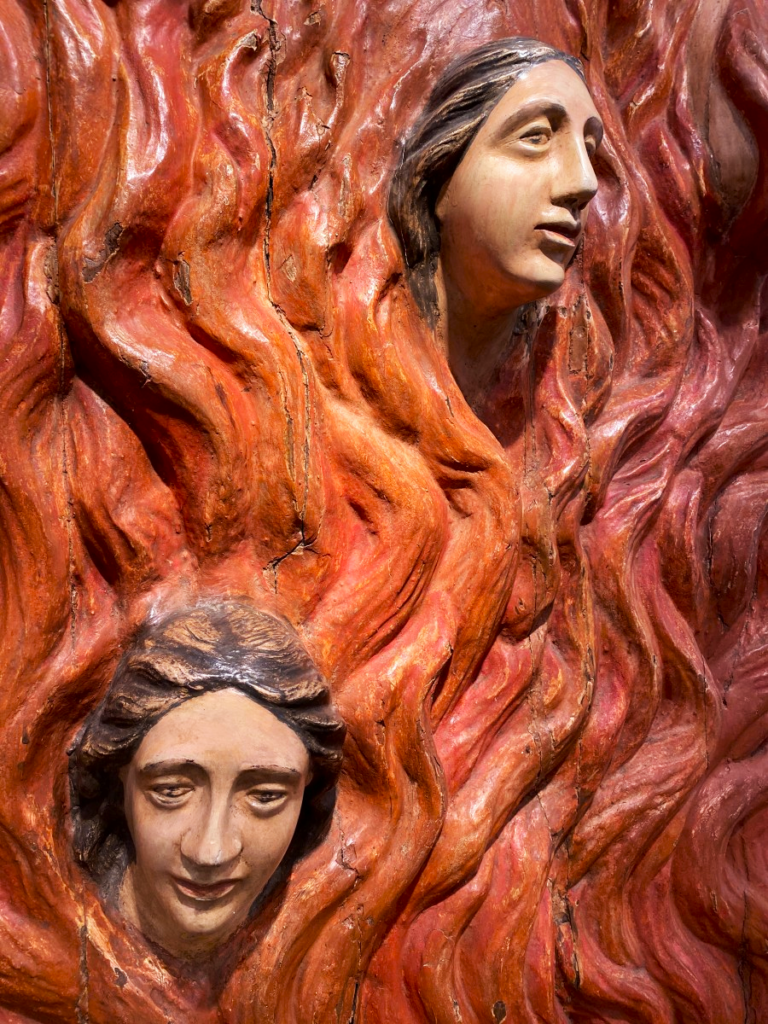TREATISE ON PURGATORY by St. Catherine of Genoa
CHAPTER X
HOW GOD MAKES USE OF PURGATORY TO RENDER THE SOUL PERFECTLY PURE
THE SOUL THERE ATTAINS SUCH PURITY, THAT WERE IT TO STAY AFTER BEING CLEANSED IT WOULD NO LONGER SUFFER.

AGAIN, I see that the love of God directs towards the soul certain burning rays and shafts of light, which seem penetrating and powerful enough to annihilate not merely the body, but, were it possible, the very soul itself. These work in two ways; they purify, and they annihilate.
Look at gold: the more it is melted, the better it becomes; and it could be melted so as to destroy every single defect. Such is the action of fire on material things. Now the soul cannot be annihilated so far as it is in God, but only in itself; and the more it is purified, so much the more it annihilates self, till at last it becomes quite pure and rests in God. Gold which has been purified to a certain point ceases to suffer any diminution from the action of fire, however great it be; for the fire does not destroy gold, but only the dross that it may chance to have. In like manner the Divine fire acts on souls: God holds them in the furnace until every defect has been burnt away, and He has brought them, each in his own degree, to a certain standard of perfection. Thus purified, they rest in God without any alloy of self: their very being is in God; they become impassible because there is nothing left to be consumed. And if in this state of purity they were kept in the fire, they would feel no pain; rather it would be to them a fire of Divine Love, burning on without opposition, like the fire of life eternal.
Reflection
The disparity between the Creator and the creature is such that for the creature to encounter the Creator without mediation, the creature would be annihilated. This is true even for an immortal soul, which even though immortal is not impassable or immutable. From another vantage point, immortality of the soul is not the eternal of the divine. Even as the soul is imago dei, what is a drop of water compared to the ocean; should the drop encounter the ocean, would the drop remain?
God encountering His creation, through various means of created mediation, is perfectly fine, not a problem, and how it works for creation. Yet the sublime mystery, a mystery that can only be known by revelation and held by faith, is that God created man so that man might encounter Him face to Face. The drop might be plunged into the ocean and remain a drop. Gold might sit in the divine fire and remain gold even as it is all living flame. That which should be by all rights annihilated, like so much breath on a mirror, isn’t and remains distinct, not consumed or subsumed, but has a true participation in God while it remains itself. This is the mystery.
The imperfect soul, in the encounter, has a secondary difficulty; its imperfections. The imperfections can be allegorized as dross in gold that is being refined, but it is important here to see that the dross is not a thing unto itself; it is not as if gold could be burned away and only the dross remains. The damned soul doesn’t have all the divine fire within it consumed and only its ugly dross remains – the damned soul is damned precisely because it has no charity within it. It is a rotten tooth without a filling; a guest without a wedding garment.
The imperfections in the imperfect are not things unto themselves – there is a crack in a wall and the wall is knocked down, the crack does not remain there in the air. Wrinkles in a sheet of paper that is smoothed are not brushed onto the table. The annihilation of this dross isn’t the annihilation of a created thing, as if sin and imperfection are things created by the devil (who has no power to create but tricks people into thinking that he does).
The furnace of the divine metallurgy is the fiery furnace of divine charity. It is said that the Father and the Son are one God because they have the same Spirit and that this Spirit is the charity that is shared between them. In this furnace of love, the Holy Spirit is lighting upon the soul and in doing so setting it alight. The human soul is to be the Temple of the Holy Spirit, the place wherein the fire of God shines forth. As Temple, the soul offers unceasing praise to her God, and only her God. There are no idols here, no alcoves where created things or self are worshiped in the dark. All is devoted to God, and there is no other, and the light of the Spirit fills all and all shadows flee.
Contemplation
Question: During this life, we create oppositions within our souls to the divine fire. We do this every time we choose to act according to a will other than God’s. All of this dross must be burned away. How can we choose to burn this dross away now, rather than later in Purgatory?
Question: The American spirit is such that it prizes independence and autonomous self about all else. How does this spirit get in the way of the Holy Spirit?
